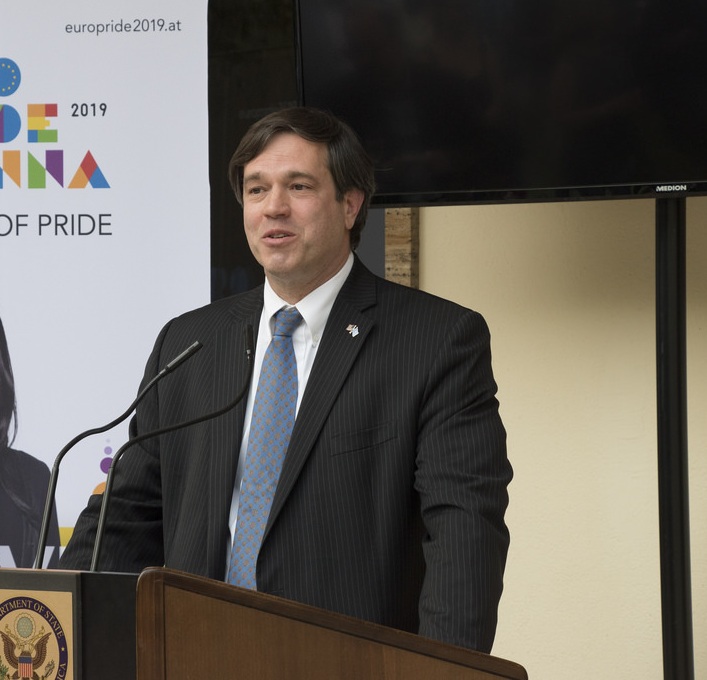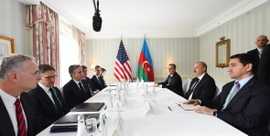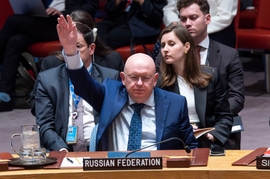On Wednesday the United States government announced that Andrew Schofer will become its new Co-Chair to the Organization for Security and Cooperation in Europe (OSCE) Minsk Group for Nagorno-Karabakh.
Schofer, who most recently served as Charge d’Affaires of the U.S. Mission to the International Organizations in Vienna, is replacing the veteran U.S. diplomat and experienced Central Asia hand Ambassador Richard E. Hoagland.
“The U.S. Administration does not have a new approach to the issue. The U.S. stance on the issue is unchanged despite the change of the Co-Chair,” Hoagland told a press conference in Washington on Wednesday.
Andrew Schofer began his career in government service in 1991, when he became a Foreign Service Officer with the U.S. Department of State. He served at American diplomatic missions in countries including Kuwait, Bahrain, Russia, the Netherlands and Cyprus. He earned a Master’s Degree in International Affairs from Columbia University and his Bachelor’s Degree in Political Science and International Relations from Yale.
Schofer is replacing Hoagland, who served as the U.S. Interim Co-Chair since January, after filling the spot left vacant by James Warlick last year. As an ambassador, Hoagland headed U.S. missions in Kazakhstan and Tajikistan; and Deputy Ambassador in Pakistan.
“[Schofer] now has complete information about the Karabakh conflict and is ready to assume his duties,” Hoagland said. “He has experience in the settlement of the Cyprus and other conflicts. I think the Secretary of State and the State Department have chosen a brilliant Co-Chair,” he added.
Shofer will assume his duties immediately after Hoagland’s expire on August 28.
U.S. involvement in the OSCE Minsk Group kicked off in Budapest in 1994, and was based on a decision to create a triple co-chairmanship platform that aimed to resolve what is often described as one of the world’s “frozen conflicts.” Along with Russia and France, the U.S. has since occupied one of the three seats.
Shortly before the fall of the Soviet Union, Armenia invaded its western neighbor Azerbaijan to gain control of the Nagorno-Karabakh region, which was heavily populated with ethnic Armenians. The two countries fought a full-scale war in the early 90s in which more than 20,000 Azerbaijanis had been killed, nearly a million were displaced, and 4,000 others were taken captive, hostage, or went missing.
Russia brokered a ceasefire in 1994, but despite it and four UN Security Council resolutions calling for the full withdrawal of Armenian forces from Nagorno Karabakh and seven surrounding districts, Azerbaijan’s sovereignty continues to go impeded.
OSCE Minsk Group efforts are centered around finding a peaceful, unarmed solution to the conflict. The groups routinely issues statements urging all sides to adhere to the ceasefire agreements, which often go unheard. Azerbaijan regularly accuses Armenia of violating protocols along the line of contact, sometimes hundreds in the span of a single day.
Despite their well-intended efforts, some analysts say the OSCE Minsk Group is highly ineffective and blame it for the lack of resolution.
“With observing the regular replacement of co-chairs I guess the mediators do not care about the long-lasting stalemate in the conflict’s settlement. The result they achieved over tens of years is obvious,” Elkhan Shahinoglu, who heads the Atlas Research Center in Baku, told Caspian News.
Matthew Bryza, the American Co-Chair from 2009-2012 and a former ambassador to Azerbaijan, said that the U.S. still has a lot of leverage, however.
“If the U.S. president cares and makes the settlement an issue on the US-Russia agenda, a lot can happen,” Bryza told Caspian News in June.







 President Ilham Aliyev shed light on the evolving contours of the peace process with Armenia during an international conference in Baku this week. ...
President Ilham Aliyev shed light on the evolving contours of the peace process with Armenia during an international conference in Baku this week. ...
 Turkmen President Serdar Berdimuhamedow and British Secretary of State for Foreign Affairs, Commonwealth Affairs, and Development David Cameron dis...
Turkmen President Serdar Berdimuhamedow and British Secretary of State for Foreign Affairs, Commonwealth Affairs, and Development David Cameron dis...
 Russia and Ukraine have engaged in direct negotiations facilitated by Qatar to address the exchange of children affected by the ongoing conflict.
Russia and Ukraine have engaged in direct negotiations facilitated by Qatar to address the exchange of children affected by the ongoing conflict.



